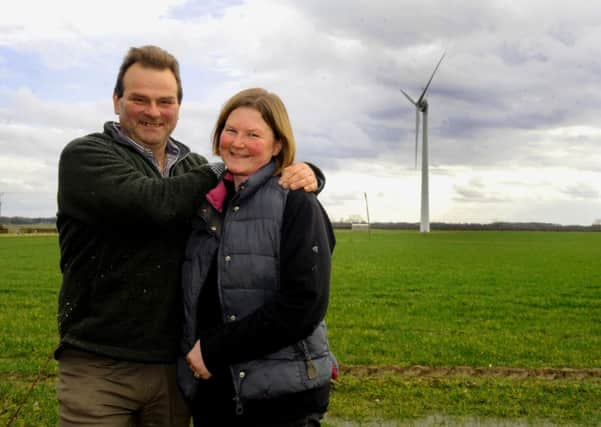East Yorkshire family’s firm belief in a dairy future


Winston has brought a new source of income since arriving at their dairy farm two-and-a-half years ago by fulfilling his role as a renewable energy resource.
It’s just as well he is there given the way Nigel’s milk price has plummeted, but it also appeared that another wind of change may have blown away any hope of the couple carrying on the family tradition of milking cows here since 1957.
Advertisement
Hide AdAdvertisement
Hide AdTwo weeks ago Nigel and Tina decided to carry on despite both having lost £120,000 nearly six years ago when the co-operative they were involved with Dairy Farmers of Britain crashed and burnt, and in the face of a current monthly milk cheque that comes in below what it costs them to produce the milk from their 150 cow dairy herd.
Their milk price has dropped from around 34 pence per litre to just under 25p in the past six months; a reduction of around 27 per cent. There are those who will scratch their heads at this and ask why stay in something that appears a constant drain on one’s own personal energy and well-being but Nigel is philosophical about where the milk price is at present.
He and Tina have formulated a plan and believe that in the long-term they can return to profitability.
“For the last couple of years we have been thinking about going out of milk or staying in and in the last two weeks we’ve made a definite decision to stay.
Advertisement
Hide AdAdvertisement
Hide Ad“Our ethos is not necessarily to expand the herd but to become more efficient. We need to get our costs of production down.”
While the Watsons have demonstrated over poor milk prices in the past - their girls photographed carrying hand-painted placards - Nigel isn’t blaming either the co-operative he currently sells his milk through (Arla), nor the supermarkets for their cheap sales of liquid milk.
“We have confidence in Arla to find markets for our milk and I’ve always said that it’s not what the price is when it’s at the bottom nor when it’s at the top. We only received around 34 pence per litre for a couple of months after all. It’s what the average price is over perhaps a three-year period that counts more and rather than focussing on the price that’s coming in you have to focus on what’s going out and try to hang on to a bit more of it.
“Arla are trying to do what they can but everything now relates to the world market. Traditionally the UK price has been 2-3p below the European price but by being one of the 3,000 members in the UK out of 13,500 Arla members through Europe, we’re getting an amalgamated price of all the products our milk is going into. It’s a much fairer system.”
Advertisement
Hide AdAdvertisement
Hide AdNigel is a third generation farmer at Mount Pleasant Farm where his grandfather Tom Milner Watson and his then teenage father Don moved to 58 years ago having farmed on the coast at Ulrome near Hornsea. The 62-acre farm they purchased at North Frodingham cost them around £6,400 at the time and hand milking was the way for their 11 dairy cows.
Today the farm runs to 185 acres owned with a further 70 rented. The 150 Holstein Friesian cows produce a herd average of just under 10,000 litres per annum and are replaced at the rate of between 20-25 per cent a year. They are milked at 6am and 5pm in a herringbone 16/16 parlour.
Nigel and Tina grow 50 acres of maize and 50 acres of cereals with the rest of the land in either grass leys or permanent pasture.
So what are the plans to bring down costs?
“We’re looking into zero grazing that would involve keeping the milking herd in most of the time and therefore leaving the grass fresh which would then produce better silage and mean we wouldn’t need to buy as much in the way of concentrates.
Advertisement
Hide AdAdvertisement
Hide Ad“It’s not quite zero because the young stock and dry cows would still be out and we’d probably let the dairy herd out during the day but the cows not being out so long would definitely help.
“We’re also moving towards a free stall system utilising comfortable cow mats and bedding with a bit of sawdust rather than the huge amount of straw we’ve been using. We can save on costs of straw and then also utilise the slurry produced by them inside instead of buying as much fertiliser to put on the land outside.”
One farming sector both Nigel and Tina are committed to avoiding even if their plans don’t work is pigs. They tried them three years ago.
“It was the longest 12 weeks of my life,” says Tina, who comes from Scawby in Lincolnshire and trained as a veterinary nurse.
Advertisement
Hide AdAdvertisement
Hide Ad“We had an empty shed and tried them on bed and breakfast but it wasn’t a pleasant experience.”
Don still helps out every day and they also have a relief milker, Kim Pickering, from nearer York who comes for three or four milkings a week.
“One thing I’m really fortunate to have is a father who has always let me get on with making decisions,” says Nigel.
“On some family farms you’re still the lad at my age (48).”